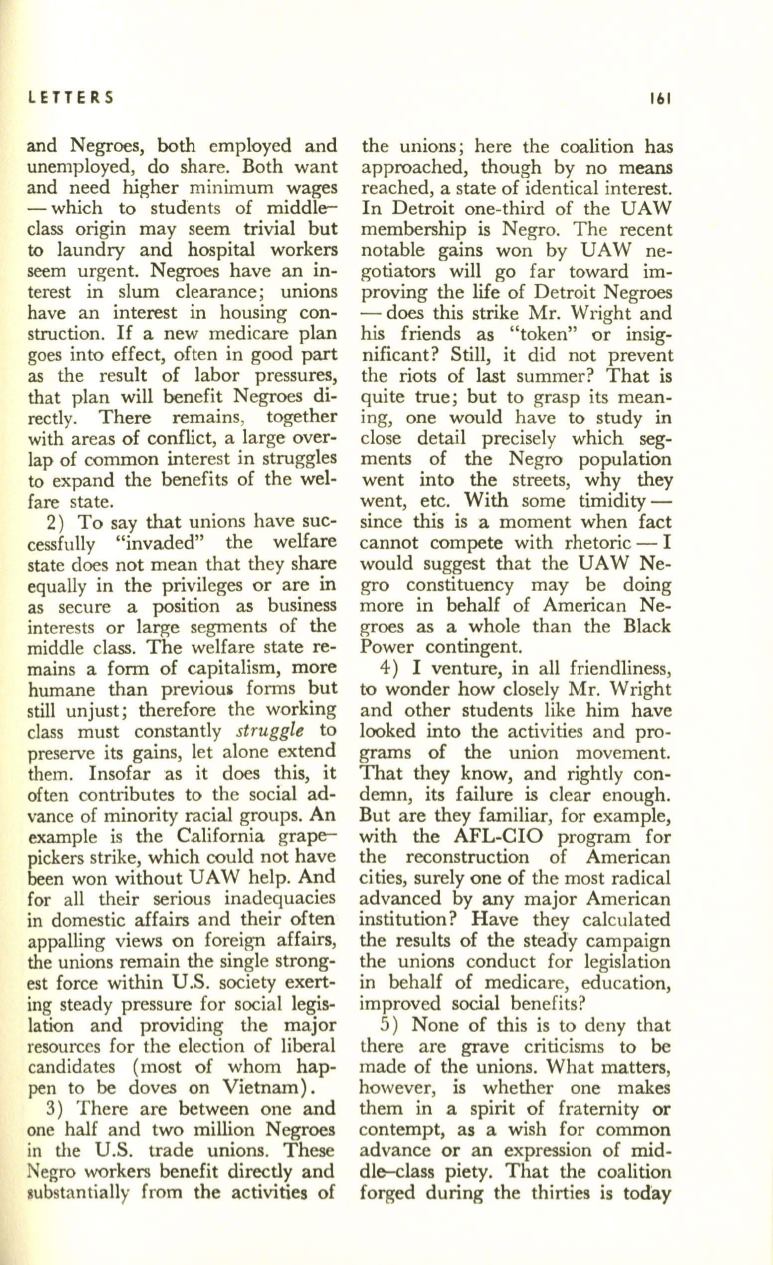
LETTERS
and Negroes,
both
employed and
unemployed, do share. Both want
and need higher minimum wages
- which to students of middle–
class origin may seem trivial but
to laundry and hospital workers
seem urgent. Negroes have an in–
terest in slum clearance; unions
have an interest in housing con–
struction.
If
a new medicare plan
goes into effect, often in good part
as the result of labor pressures,
that plan will benefit Negroes di–
rectly. There remains, together
with areas of conflict, a large over–
lap of common interest in struggles
to expand the benefits of the wel–
fare state.
2) To say that unions have suc–
cessfully "invaded" the welfare
state does not mean that they share
equally in the privileges or are in
as secure a position as business
interests or large segments of the
middle class. The welfare state re–
mains a form of capitalism, more
humane than previoUil forms but
still unjust; therefore the working
class must constantly
struggle
to
preserve its gains, let alone extend
them. Insofar as it does this, it
often contributes to the social ad–
vance of minority racial groups. An
example is the California grape–
pickers strike, which could not have
been won without
VAW
help. And
for all their serious inadequacies
in domestic affairs and their often
appalling views on foreign affairs,
the unions remain the single strong–
est force within V.S. society exert–
ing steady pressure for social legis–
lation and providing the major
resources for the election of liberal
candidates (most of whom hap–
pen to be doves on Vietnam).
3) There are between one and
one half and two million Negroes
in the V.S. trade unions. These
Negro workers benefit directly and
~ubstantially
from the activities of
161
the unions; here the coalition has
approached, though by no means
reached, a state of identical interest.
In Detroit one-third of the
VAW
membership is Negro. The recent
notable gains won by
V
AW ne–
gotiators will go far toward im–
proving the life of Detroit Negroes
- does this strike Mr. Wright and
his friends as "token" or insig–
nificant? Still, it did not prevent
the riots of last summer? That is
quite true; but to grasp its mean–
ing, one would have to study in
close detail precisely which seg–
ments of the Negro population
went into the streets, why they
went, etc. With some timidity–
since this is a moment when fact
cannot compete with rhetoric - I
would suggest that the
VA
W Ne–
gro constituency may be doing
more in behalf of American Ne–
groes as a whole than the Black
Power contingent.
4) I venture, in all friendliness,
to wonder how closely Mr. Wright
and other students like him have
looked into the activities and pro–
grams of the union movement.
That they know, and rightly con–
demn, its failure
is
clear enough.
But are they familiar, for example,
with the AFL-CIO program for
the reconstruction of American
cities, surely one of the most radical
advanced by any major American
institution? Have they calculated
the results of the steady campaign
the unions conduct for legislation
in behalf of medicare, education,
improved social benefits?
5) None of this is to deny that
there are grave criticisms to be
made of the unions. What matters,
however, is whether one makes
them in a spirit of fraternity or
contempt, as a wish for common
advance or an expression of mid–
dl~lass
piety. That the coalition
forged during the thirties is today


